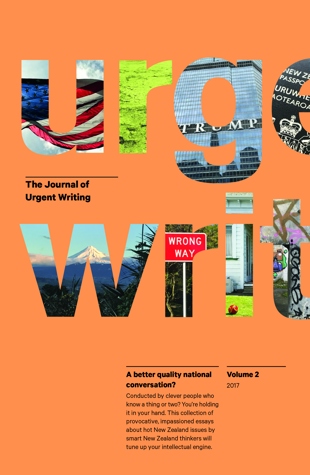1. Urgent. How urgent?
Always urgent, in the sense that climate change, the poverty of our political options and the relationship of race, identity and community always are. And it’s election year, so the urgency of those themes has had more prominence. But these are essays, not debating points or party policies. Written before the election campaign got started and due to be published after it was all over, they offer nuanced views and complex realities missing from most of the polls and headlines and endless media analysis.
2. Who did you seek out to write for you and why?
I wanted a mix: younger and older, men and women, different ethnicities, and people from different parts of the country. Different kinds of writing, too: there are academics and post-grad researchers, also journalists and a couple of (local body) politicians known not so much as writers but for the strength of their ideas. I’m especially pleased to have included some literary writers, including two playwrights, and to have balanced the more experienced and well-known writers with several who will be new to most readers.
3. How would you describe this bunch of scholars and scribes?
Actually, I’m not sure they form a single bunch. Several have told personal stories, looking down and back into their own pasts in order to illuminate various current debates. Others are more directly polemical. And a couple are quite fanciful: imagining a world that doesn’t exist, as a mechanism for challenging us all to do better with the one that does. They do, though, share a sense of the value of some bright shining ideas.
4. The collection has a zeitgeisty feel. Can you put your finger on it?
Change is in the air. Volatility now attends to politics, economics, social structures, value systems and so much more, and with it comes opportunity. Donald Trump looms in the background of these essays (and is directly the subject of one of them), but against his corrosive influence there is a countervailing sense of hope. A sense that old ways are failing and new solutions might be at hand. There is another strong thread. The assertion of identity, based on history, is woven right through this collection.
5. Was that an accident or a cunning plan?
Accidental plan. Political change, identity, climate change and Trump all felt essential to me, but I kept an open mind about how they might be approached. Even when I suggested topics to some of the writers, like as not they came back with something else. I think the collection achieves a certain serendipity caused by that. But I always knew the essays focused on politics would overlap a little and feed each other, and that this would be true for the personal histories too. None of the writers knew anything about what each other was doing, but as the collection took shape I was pleased at how each essay was able to enrich several others and be enriched by them.
6. It’s interesting reading these essays now the election has been and gone. They were all written before 21 September. Do they still hold?
Definitely. They were all written to be read after the election, some of them quite explicitly: the writers had some things to say once the dust had settled. They all, in one way of another, ask a question about where we go from here – wherever ‘here’ has turned out to be.
7. Which writer surprised you the most?
Morgan Godfery is known as a media commentator who delivers sharp political analysis, especially in relation to te ao Māori and politics, but he chose to write a very personal history about his parents. His purpose remains both political and cultural, but when he told me that was what he wanted to do I was extremely surprised. Thrilled, too. It’s such a remarkable essay, I was very proud to choose it to lead the collection.
I should also mention Emma Espiner. In her essay she proposes that politicians should conduct themselves according to tikanga Māori. Is it a joke, a kind of quietly magnificent satire? Or is there any good reason at all why she mightn’t be right? It’s one of those ideas that’s so surprising because you can’t just shake it off and it has the potential to change everything.
8. What’s one new thing you learned from working on this collection?
The commitment to New Zealand as a social laboratory is still very strong. It gets a lot of thinkers and writers and activists up in the morning.
9. Good to be editing again?
Yes, indeed. I love editing, I began my professional career as a book editor and have been an editor in one form or another for most of the time since. When I write more than edit, I miss the editing, although when it’s the other way around I have to say I miss the writing too. Good to do both.
10. What are you reading at the moment?
I’ve known Diana Wichtel for many decades without knowing about her father, and am just about to start her book about him, Driving to Treblinka. I’ve almost finished Sara Taylor’s short story collection The Shore, which I missed when it first came out in 2015: brilliant, visceral tales covering almost 200 years in the lives of women in an extended family in poor southern America. I’m also happily buried in Edward Glaeser’s The Triumph of the City, which is a few years old now but exactly what I need to recharge the batteries as a writer on urbanist issues.


